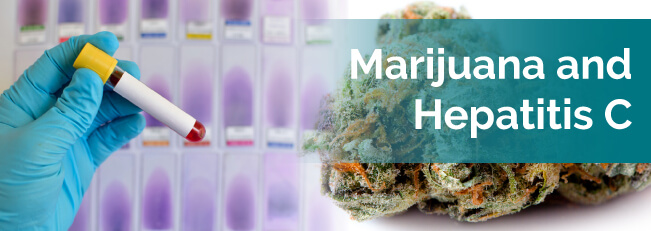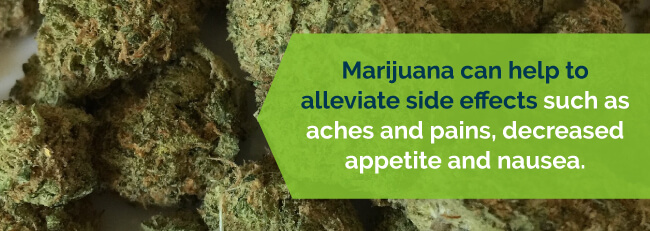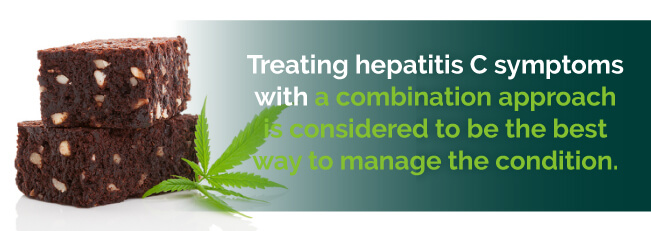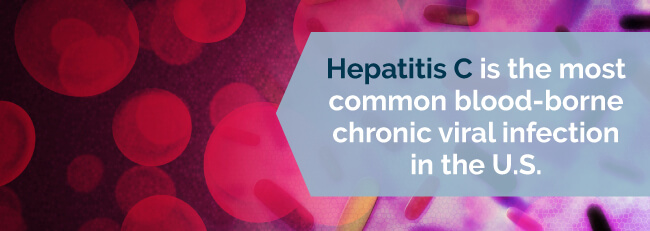
Hepatitis C is an often chronic infection of the liver caused by the hepatitis C virus (HCV), which can result in cirrhosis of the liver. If you’re newly diagnosed with hepatitis C, it’s likely that you’re wondering what the condition is, the potential side effects of conventional treatment and whether medical cannabis for hepatitis C can help you.
Research suggests that cannabis has the potential to offer therapeutic benefits to patients with Hepatitis C and many states have approved medical marijuana specifically for the treatment of hepatitis C.
While pot alone cannot treat hepatitis C, you can use it in a complementary way along with your physician-prescribed medications. Its mood-elevating, pain-killing properties can provide you with relief, enabling your body to begin to heal.
A correlation exists between the use of medical marijuana and hepatitis C symptoms. Research suggests medical marijuana has therapeutic benefits if you’re suffering from HCV. Additionally, the medicine’s side effects are typically mild and classified as “low risk,” with euphoric mood changes among the most frequent.
Scientific and anecdotal evidence tell us medical marijuana is a safe, effective medicine that helps patients with Hepatitis C endure the side effects of treatment—therefore helping patients complete the entire treatment regimen. Marijuana can help to alleviate side effects such as aches and pains, decreased appetite and nausea.
Find A Doctor Find A Dispensary

A 2006 report published in the European Journal of Gastroenterology and Hepatology discussed a study conducted in Northern California that supported this idea.
Here’s how it works. The two main cannabinoids found in marijuana, cannabidiol (CBD) and tetrahydrocannabinol (THC), bind with your body’s cannabinoid receptors (CB1 and CB2). When CB2 is activated, it creates a positive, anti-inflammatory effect in your liver that decreases the severity of HCV symptoms.
One study in 2013 debunked previously held clinical conclusions that smoking pot harms the liver. Another discovered taking cannabinoids inhibited some pro-inflammatory processes and significantly reduced liver injury in mice.
There are many marijuana strains that provide a positive and energy boosting effect and help you to manage vomiting, nausea and other upsetting symptoms of conventional hepatitis C treatment.
For relieving inflammation and pain, you’ll want to use an Indica strain. These strains are high in THC and function as powerful sedatives that may enable you to get the rest you need.
Indica-dominant strains usually have a strong, sour or sweet odor and create a relaxed feeling that’s helpful in treating sleeping disorders, physical pain and generalized anxiety. Some medical pot patients find that consuming Indica buds before going to bed helps even if they were previously experiencing sleeping difficulties.
Other Indica strains include:
If you find heavy Indica strains to be too sedating, try a hybrid or Indica-dominant strain consisting of 70 percent Indica and 30 percent Sativa. Some examples are:
Sativa strains tend to smell more natural and “grassy.” They generate a more energized and uplifted feeling, making them more suitable for daytime use. These strains can be useful if you’ve been suffering from a low mood. Some examples include Jack Herer, Sour Diesel and Purple Haze. Additional strains include:
When investigating the right strain to use, it’s a good idea to speak to a medical marijuana doctor or dispensary budtender.
Treating hepatitis C symptoms with a combination approach is considered to be the best way to manage the condition. To stimulate your immune system, you could take essential hemp oil a few times a day. If pain comes on suddenly, vaporizing the drug can help. Should your discomfort continue, edibles in the form of cookies or brownies might be beneficial. These can be eaten no matter where you are and without drawing unwanted attention to yourself.

Getting the medical marijuana for hepatitis C dosage right involves trial and error. After time and with the right information from your medical marijuana doctor or a budtender, you’ll soon find the combination that works for you. It’s recommended to start off slowly with minimal amounts of cannabis. Taking too much too soon could make you feel groggy and unwell until the effects of the drug wear off.
Research on marijuana as a treatment for HCV is still in its infancy, but preliminary thoughts are positive. If you feel that pot could be a useful addition to your personal treatment plan, it’s time to search for a medical marijuana doctor or dispensary today.
Now you know about the positive effects medical marijuana can have, you may be interested in the next step. First, you’ll need to find out if your state has marijuana laws related to hepatitis C.
Thirteen marijuana states include Hepatitis C on their list of qualifying conditions: Arizona, Arkansas, Delaware, Illinois, Maine, Maryland, Massachusetts, Michigan, New Mexico, North Dakota, Ohio, Rhode Island and Washington. With a recommendation from a physician, some states, including California, Connecticut, Nevada, Oregon and Washington, D.C. will consider allowing medical marijuana to be prescribed for hepatitis C.
State laws on the use of medical marijuana are continuously being passed. You can be added to our medical marijuana for hepatitis C wait list if your state has yet to qualify medical cannabis for cancer.
If you or a loved one is looking to find relief from symptoms of hepatitis C, MarijuanaDoctors.com can help. We can connect you with hundreds of quality marijuana doctors and dispensaries in all legal marijuana states and ensure you are in compliance with your state laws. Book an appointment today and let us help improve your quality of life!
For more information about how cannabis can be used to treat Hepatitis C, check out our resources:
Find A Doctor Find A Dispensary
Hepatitis C attacks your liver. Spread through contaminated blood or via sexual contact with someone who’s infected, hepatitis C is a viral infection, known as the hepatitis C virus, or HCV, that causes inflammation of the liver. It can lead to significant liver damage.
About half of the people infected with the disease are unaware of their hepatitis C status because symptoms of the disease sometimes do not show for decades. Thankfully, chronic hepatitis C is usually curable by taking medications for between two and six months.
Your liver is the largest and one of the most vital organs in your body. It helps remove toxins, stores energy and digests food. Hepatitis C doesn’t go away by itself. You can be infected for a lifetime. Without treatment, you can continue to suffer cirrhosis of the liver or develop liver cancer.
HCV exists throughout the world most commonly in two different forms: type 1 and type 2. Type 1, the more prevalent of the two, is mostly diagnosed in North America and Europe. Type 2 is less widespread, although it’s also found in people in these two places. Other strains of the virus are primarily found in Africa, Asia, and the Middle East.
You are most at risk of contracting the virus if you:
You cannot contract hepatitis C from any of the following:
Additionally, a baby cannot contract hepatitis C from breast milk.
Hepatitis C is responsible for most of the liver transplants conducted each year. It affects 300 million people worldwide, and 8,000 to 10,000 people die each year from the chronic liver disease caused by this condition.

Information from the National Institute of Diabetes and Digestive and Kidney Diseases indicated that hepatitis C is the most common blood-borne chronic viral infection in the U.S. Between 2.7 and 3.9 million people in the country have chronic hepatitis C.
The World Health Organization (WHO) reports that:
Although there are currently no vaccines for HCV, ongoing research is being conducted in this area.
The most common way to contract hepatitis C is by sharing drug paraphernalia like needles, water, cotton and spoons. Before 1992, it was possible to get the disease through organ transplants and blood transfusion. Since then, all donated organs and blood are screened for hepatitis C, so it’s extremely unlikely to contract the virus in this way now.
A slow parade of drugs has been introduced to treat HCV. We’ll touch on them in more detail later.
In 1989, Chiron Corporation and the Centers for Disease Control and Prevention worked together to identify the virus. Then, in 1991, the Food and Drug Administration (FDA) approved Intron A to treat HCV. By 1998, the FDA had approved the use of a combination of Ribavirin and Interferon, which became paramount to the advancement of HCV therapy.
A new HCV rapid antibody test, known as the OraQuick test, was introduced in 2010. The OraQuick test can provide results within just 20 minutes. In 2013, new medications were approved. Sofosbuvir (Sovaldi) and Simeprevir Olysio boast higher cure rates, can be taken orally, take less time to work and have fewer side effects than older drugs.
When you’re suffering from a long-term (chronic) hepatitis C infection, you’ll find yourself experiencing some or all of the following symptoms:
Chronic hepatitis C begins with an acute phase. You might not even know you’re ill during this stage of the disease, as you rarely have symptoms. Because acute HCV infection is most often asymptomatic, it’s uncommon that people are diagnosed during the acute phase.
If there are symptoms present during the acute phase, you’ll usually feel fatigue, fever, muscle aches and have jaundice. These symptoms show between one and three months after you’ve been exposed to HCV.
Acute HCV doesn’t always lead to the chronic stage. Some individuals can clear the infection from their bodies by themselves. However, between 75 and 85 percent of people with the acute form of the disease will progress to chronic hepatitis C. If you feel you’re at risk of having contracted the virus, your first move should be to get tested. That way, you can get on the road to health quickly.
Having hepatitis C can make you feel sick. Therefore, a quick diagnosis and treatment are imperative. If you don’t seek help, the following can occur:
A hepatitis C diagnosis is something that should never be taken lightly. Thankfully, using a combination of traditional medical treatment and medical marijuana, the disease can be eradicated. In many cases, you can go on to live a full and healthy life.
HCV treatments are changing rapidly. Hepatitis C is typically treated with interferon medication, but many patients are unable to complete the full treatment regimen due to the severe side effects it can induce. These include fatigue, insomnia, loss of appetite, nausea, chills, fever, muscle and joint pain, and depression. Because of these side effects, many patients are forced to reduce their doses or discontinue treatment altogether — both of which deter interferon’s effectiveness against the Hepatitis C virus.

The usual hepatitis C treatment is now centered on direct-acting antiviral drugs (DAAs). Antiviral drugs tend to have fewer side effects than interferon.
Some of the most commonly prescribed treatments and their side effects include:
|
Treatment |
Potential Side Effects |
|
Interferon |
Low blood cell counts |
|
Harvoni |
Nausea |
|
Ribavirin |
Insomnia |
|
Olysio with Ribavirin and Interferon |
Muscle pain Itching Rash with sensitivity to sunlight Nausea |
|
Sovaldi with Ribavirin and Interferon |
Itching |
|
Sovaldi with Ribavirin |
Itching Nausea Flu-like symptoms Insomnia |
|
Viekira Pak with Ritonavir, Dasabuvir, Paritaprevir and Ombitasvir |
Weakness |
|
Zepatier |
Headache |
The symptoms and side effects of treatment can be overwhelming. Keep in mind that you need to continue to take your doctor-prescribed medications to rid your body of the virus. For some, using conventional treatments and medical marijuana for hepatitis C symptom relief is extremely effective.